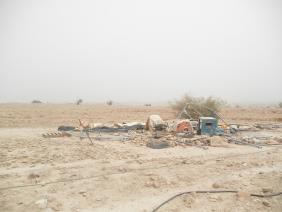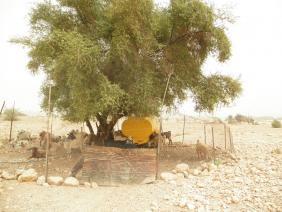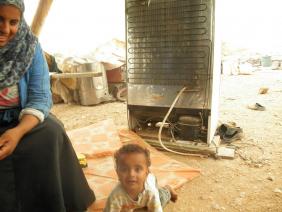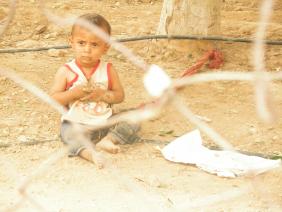Fassail demolition rubble, Duma village condolence visit
on August 18, 2015, the Israeli authorities demolished the hoimes of six families in Fassail (village in the Palestinian Jordan Valley)  and left dozens of persons, mostly children, exposed to the cruel August sun; Condolence visit to Duma village
and left dozens of persons, mostly children, exposed to the cruel August sun; Condolence visit to Duma village
The gray smog blanket that descended on the whole country did not make much difference in the arid, yellow land, filled with scattered metal rods and nylon sheets that had been home to dozens of people. They live  outdoors anyway, in the excruciating heat (high above 40 degrees centigrade), crowding under
outdoors anyway, in the excruciating heat (high above 40 degrees centigrade), crowding under  the 3-4 trees that have survived numerous such summers, breathing constant dust. In Fassail the smog was not a conversation issue – what is short lived extreme smog in view of the fact that again they have no home, no shelter from the horrendous weather conditions and desert animals. And what will follow this smog? Winter is at the gate, and how will they protect 10-month old Ahmad from the rain and wind? And if shelter be built – when will the bulldozers and their operators, indifferent to human suffering, arrive and crush everything yet again?
the 3-4 trees that have survived numerous such summers, breathing constant dust. In Fassail the smog was not a conversation issue – what is short lived extreme smog in view of the fact that again they have no home, no shelter from the horrendous weather conditions and desert animals. And what will follow this smog? Winter is at the gate, and how will they protect 10-month old Ahmad from the rain and wind? And if shelter be built – when will the bulldozers and their operators, indifferent to human suffering, arrive and crush everything yet again?
What demon sat in his air-conditioned office over a map and marked – here and here and here – to be demolished. “Illegal construction!” As no construction permits whatsoever have been issued here since (the Israeli  occupation in) 1967, everything erected in this time is illegal, certainly the tents and shanties of these people who have already been so often expelled from their homes in Ein Gedi and Nu’eima, Al Ujja and Ein Al Sultan, they and their flocks. And all they have left is this yellow, stony, harsh piece of wasteland in which to raise their tents and shanties, in the heart of the Palestinian village of Fassail, far from any Jewish settlement wishing to expand, or from any training zone of the occupation army. Land that no one wants beside those who have nothing, and have nowhere to go. No reason whatsoever but for the meanness of land-mongers motivated by the sole desire to expel, to ethnically cleanse the region of its Palestinian inhabitants.
occupation in) 1967, everything erected in this time is illegal, certainly the tents and shanties of these people who have already been so often expelled from their homes in Ein Gedi and Nu’eima, Al Ujja and Ein Al Sultan, they and their flocks. And all they have left is this yellow, stony, harsh piece of wasteland in which to raise their tents and shanties, in the heart of the Palestinian village of Fassail, far from any Jewish settlement wishing to expand, or from any training zone of the occupation army. Land that no one wants beside those who have nothing, and have nowhere to go. No reason whatsoever but for the meanness of land-mongers motivated by the sole desire to expel, to ethnically cleanse the region of its Palestinian inhabitants.
At 8 a.m. we crossed the Gitit (Maale Efrayim) Checkpoint, manned by 2 soldiers who waved us through with a friendly gesture. Perhaps they didn’t know who we are…
In Fassail we find Hajar, her daughter-in-law Huda and little grandchild Ahmad under the ficus tree, their new home, surrounded by all their belongings, a ruined refrigerator, household and kitchen utensils and lots of the plastic sheets and rocks that had served as their home. Next to them mattresses are spread, where the family sleeps, with an old ventilator directed at them and a long electric wire connecting it to the power line along the main road. The wire has been taped together at various spots that were cut by the demolition crew. Hajar tells us their home was demolished by mistake because the Israeli court had issued an injunction, an restrictive order. So they made a mistake, so what? What happened after all? Just ten people including children and babies remained homeless. No (Israeli) eyes would remain sleepless on their account.
Hajar is an amazing woman, delicate and proud. Under no circumstances would she accept financial aid from us. Even the clothes we brought embarrassed her and her daughter-in-law took them when Hajar ran off. In spite of the heat and smog, it was to sit with her and her daughter-in-law under the ficus tree, in the absence of men who always take over the conversation. She told us that in November her home was demolished, as well as two years earlier. It is a regular cycle, but always unexpectedly, when the demolition crews take down the homes of Fassail Al Wussata’s inhabitants.
We entered the neighborhood and reached a well-tended shanty next to a pile of crumpled tin sheets and metal rods, household utensils and a broken TV set. We were received by Nada who invited us into her temporary home, a neat spotless home consisting of one room and a kitchen. Nada is 36-years old, mother to eight children ages one-year to sixteen. Nada’s home, too, was demolished on August 8, 2015 (the piles of rubble we saw outside) and her family was left homeless. Her brother-in-law, married and father of one, moved to Nu’eima and left them his shanty temporarily. It is easier for the smaller family to move elsewhere. “We want nothing large” says Nada, “just a place to lice”. Two years ago her home was also demolished.
They came to Fassail four years ago, after their Nu’eima home was demolished time and again.
“We asked the demolition crew – where do you want to go? Just tell us where to settle down and we’ll go there. Just let us live!”
And indeed, what meanness, what cruelty – at this godforsaken spot, all stones and dry yellow soil in which nothing grows but a few lone trees and even that is fortunate! What else could shelter them and their sheep from the cruel sun, a sun no more cruel than the men who have crushed and broken and devastated the lives of these people whose only wish is TO LIVE!
Nada has beautiful daughters who get home from school at 11 a.m. (they were sent home early because of the extreme heat and smog conditions) in shining starched school uniforms. They immediately run off to the kitchen to take them off and save it for tomorrow.
Nada also has a 14-year old son who is both brain- and body-impaired and is confined to a wheelchair. He stays at an institution in Al Azariya, Jerusalem. They will visit him during the coming holiday. His maintenance there costs them 300 NIS a month, but there are no conditions to keep him at home. When she was given clothes for her children she said, “Clothes are of no importance. I feel that you sense my pain and take part with me, that is what counts!”
She was indeed very moved by the solidarity expressed in our visit and company.
All women are very isolated there. There are no ties among the various clans, and the husbands go off to work in the settlements or in Jericho. They are left on their own and for no reason ever leave their home. Even not to go shopping in the village, Fassail Al Tahta. Hajar will only go with her husband to visit her parents and grandfather in the Al Sultan refugee camp in Jericho when the holiday comes. And Nada will visit her own parents in Nu’eima.
They are all expelled from their original home-towns and villages, whether inside Israel proper (“inside ‘48”) or other localities in the 1967 Occupied Territories – thrown about from one place to another, and not allowed to stay anywhere, their homes are demolished by the Israeli authorities everywhere they go.
So really, where will they live?
Condolence visit at the home of Riham Dawabsha in Duma village
This is not the first time I ask myself from where come such heart and spirit powers that enable Palestinians to receive women such as ourselves, Israeli, Jewish, with such friendliness following such a cruel murder of a sleeping family? Often I hear the comparison with the (murdered) Fogel family in the Jewish settlement of Itamar, and wonder whether a delegation of Palestinians from Hawwarah village, as peace-loving as they may be, would come for a condolence visit during the Shivah in Itamar – would they even be allowed to enter the settlement? Even on our way to the family home (the get-together was at the uncle’s home) people were glad to show us the way, and the children whom we passed and who did not know we were headed offer the family our condolences, looked at us, Jewish women, with curiosity but not animosity. It is inconceivable. In this very village my fellow countrymen have committed a shocking crime – and no anger awaits us? No wish for revenge? No “Death to the Jews!”, any Jews?
On our way to the uncle’s home, we saw the incinerated family home and people coming and going there. We did not wish to enter.
At the uncle’s home women came together to mourn, some of them on a mat on the floor - the murdered woman’s grandmother and various aunts. Gradually more and more women arrived until the room filled up. In my opinion many simply came to see the Jewish women who had come to express condolences and solidarity. Our presence obviously moved them deeply. Riham’s mother sat next to me, took my hand in hers and never let go. I didn’t know how to cope with her affection. Her face wordlessly expressed the pain of a mother, and grandmother, who has lost her loved ones. My heart went out to her. But now words came. Mainly we kept quiet.
After an hour of painful feelings and embarrassment, we left, in spite of the women’s protests who begged us to stay on a bit.
Incidentally, they lovingly mentioned Hadas.
Driving out of the village we saw a line of incinerated olive trees. Settlers? Or just a burning cigarette?
